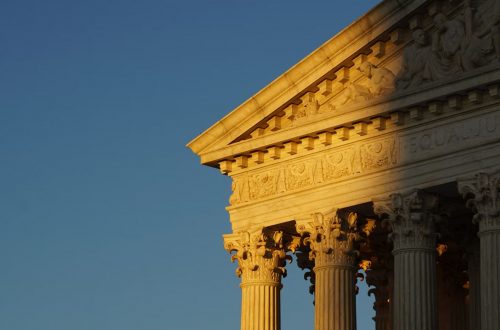Today’s Washington Post observes the widespread support for Israel and for Jews among evangelical Christians. The piece is titled, “Among Evangelicals, A Kinship With Jews.†The paper quotes excerpts from an interview with Mark Noll that should raise the eyebrows of anyone who cares about the gospel.
Mark A. Noll, a professor of Christian thought at Wheaton College, a center of evangelical scholarship in Illinois, said evangelicals are beginning to move away from supersessionism — the centuries-old belief that with the coming of Jesus, God ended his covenant with the Jews and transferred it to the Christian church.
Since the 1960s, the Roman Catholic Church and some Protestant denominations have renounced supersessionism and stressed their belief that the covenant between God and the Jewish people remains in effect.
Evangelicals generally have not taken that step, but ‘among what you might call the evangelical intelligentsia, questions of supersessionism have come onto the table,’ Noll said. “It’s in play among evangelicals in the way that it was in mainline Protestantism and Catholicism — but wasn’t among evangelicals — 30 or 40 years ago.â€
What Noll refers to here is not the belief among many evangelicals that there will be widespread conversion of Jews to Christ at some point in the future (along the lines of Romans 11:26). What Noll refers to is the idea that the Jews have a favored status with God apart from Jesus. This favored status consists in their election by God to be in covenant with him—a covenant that God made with the patriarchs all the way back in Genesis beginning with Abraham.
This idea has been popular among mainline Protestant for some time, and it holds that God’s promises to bless Israel are still in effect for the Jews even though the Jews by and large do not embrace Jesus as their Messiah. In other words, because of the covenant with Abraham, the Jews can have salvation apart from faith in Jesus the Messiah. The shocking thing that Noll brings forth is how this idea is making inroads among the “intelligentsia†of evangelicalism.
But what Noll doesn’t address is the somewhat ironic fact that many conservative evangelicals, who would otherwise affirm that there is no salvation apart from faith in Jesus the Messiah, make the claim that non-Christian Jews have a favored status with God even though they do not embrace Jesus as their Messiah. This is in fact what the Post article is all about. These sentiments characterize the remarks of a Southern Baptist pastor who was interviewed:
“I feel jealous sometimes. This term that keeps coming up in the Old Book — the Chosen, the Chosen,†says the minister, who has made three trips to Israel and named his sons Isaac, Jacob and Joseph. “I’m a pardoned gentile, but I’m not one of the Chosen People. They’re the apple of his eye.â€
Comments such as these are unfortunate because they actually detract from the central truth that Jesus is the Jewish Messiah, and all the blessings of the covenant with Abraham can only be obtained through faith in Jesus. The blessings of the covenant only come to those who believe in the crucified and risen Messiah, and any Jewish person who does not believe in this Messiah has broken the covenant and is liable to judgment. If one wants to drink from the rich root of Israel (Romans 11:17), they must do so by faith in Jesus the Messiah.
These Gospel truths have a profound impact on how Christians should feel about the middle-east conflict today. The secular state of Israel today may not claim a present divine right to the Land as long as they reject the Messiah and are thereby covenant breakers. Until the mass of Jews convert their allegiance to Jesus the Messiah, God will not bless them according to the terms of the covenant. That is why every evangelical who anticipates a “future for Israel†in the Holy Land also anticipates a mass conversion of the Jews before that blessing comes. So even traditional dispensationalists are inconsistent when they claim that the Jews have a right to the land now.
This does not mean, however, that there are no reasons to be supportive of the secular state of Israel. It is the only democracy in the region (Iraq, nothwithstanding). You will hear me from time to time expressing support for Israel on this basis because I think democracies promote justice. But I will never argue that God is obligated to bless anyone apart from Christ. That idea simply does not appear in the Scriptures anywhere.
For more on this topic, I recommend John Piper’s sermon “Israel, Palestine, and the Middle East.â€




4 Comments
Steve Weaver
Excellent post! I preached on this same topic today (kind of) in my series on Romans (I’m in Romans 11.). My sermon manuscript is onlne at my blog if anyone is interested.
C Miller
Amen, brother! Preach it!
Paulos
Amen! American foreign policy concerning the nation called Israel does not nor should it derive from the Abrahamic covenant. We who have hearts circumcised by the Spirit of God are the true Jews, the seed of Abrahma, in fulfillment of God’s covenant with Abraham.
Pingback: